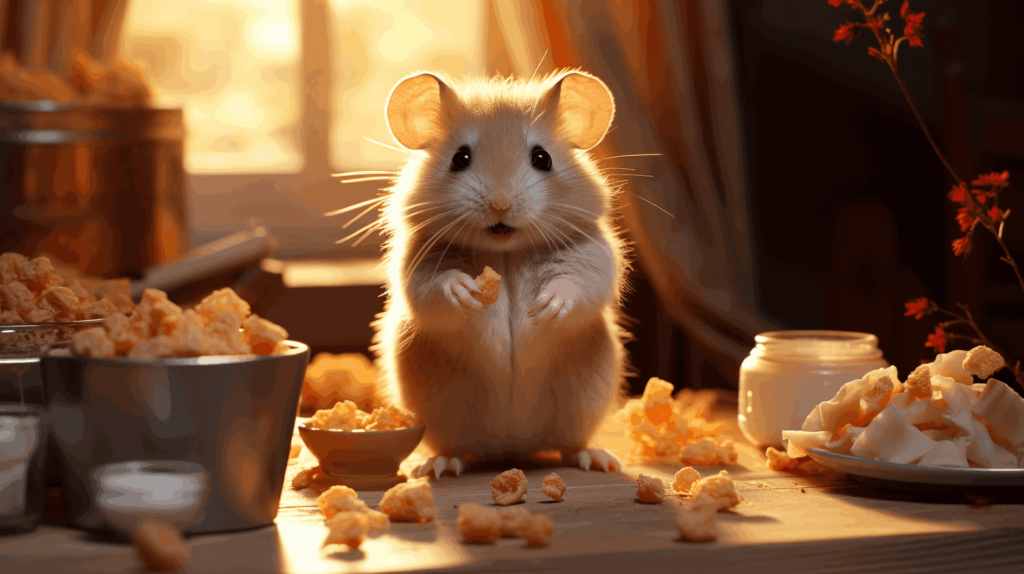Pig owners often wonder if they can treat their beloved animals to popcorn. This guide dives into the safety, nutritional benefits, and potential risks of popcorn consumption in various pig breeds.
Key Takeaways
- Always choose homemade popcorn without preservatives or artificial ingredients for pigs.
- Avoid popcorn or foods with xylitol, which is toxic to pigs.
- All prominent pig breeds, including mini pigs, can enjoy popcorn in moderation.
- Popcorn offers fiber, energy, and vital nutrients beneficial for pig health.
The Nutritional Value of Popcorn for Pigs:
Popcorn serves as a wholesome snack for pigs. Rich in fiber, it promotes a healthy digestive system and provides needed energy. Popcorn also contains essential B-complex vitamins, iron, potassium, copper, manganese, phosphorus, zinc, and magnesium, which are crucial for pigs’ growth, skeletal development, and fertility.
Homemade Popcorn is the Safest Option
When considering the safety of feeding popcorn to pigs, it is essential to recognize that homemade popcorn, free from additives and artificial ingredients, is the safest option.
Popcorn can be a healthy snack for pigs, as it is a good source of fiber and provides energy while promoting a healthy gut. Additionally, popcorn contains B-complex vitamins, iron, potassium, copper, manganese, phosphorus, zinc, and magnesium, contributing to a pig’s fertility, general health, growth, and skeletal development.
However, it is essential to exercise moderation and caution when serving flavored popcorn to pigs. While pigs can eat popcorn with certain flavorings, such as salt and cheese, it is best to stick to plain, air-popped popcorn to avoid any potential risks associated with additives or artificial ingredients.
Xylitol Toxicity and Health Complications
Importantly, xylitol toxicity in pigs can lead to severe health complications, including low blood sugar, vomiting, lethargy, dizziness, and seizures. Xylitol is a sweetener commonly found in certain food products, including some flavored popcorn. Pigs are susceptible to xylitol toxicity, and ingesting foods containing this substance can harm their health.
Low blood sugar, or hypoglycemia, can be dangerous for pigs and may result in weakness, confusion, and even loss of consciousness. Vomiting, lethargy, dizziness, and seizures are additional symptoms that can result from xylitol toxicity. Therefore, ensuring that any popcorn given to pigs does not contain xylitol or any other potentially harmful ingredients is crucial.
If a pig consumes popcorn or any food item containing xylitol, immediate veterinary assistance should be sought to prevent further complications.
Immediate Veterinary Assistance for Xylitol Consumption
In the case of xylitol consumption by pigs, seeking immediate veterinary assistance is crucial to ensure prompt and appropriate medical intervention. Xylitol, a sweetener commonly found in various food products, can be highly toxic to pigs and lead to serious health complications.
To emphasize the importance of seeking veterinary help, here are four key reasons why immediate assistance is necessary:
- Early detection: Veterinarians can quickly assess the severity of xylitol poisoning and take immediate action to prevent further harm to the pig.
- Treatment options: Veterinary professionals have the knowledge and resources to provide the most effective treatment for xylitol poisoning, including administering medications and managing symptoms.
- Preventing complications: Prompt medical intervention can help prevent complications such as low blood sugar, vomiting, lethargy, dizziness, and seizures, which can be life-threatening for pigs.
- Professional guidance: Veterinary assistance ensures that the pig receives appropriate care and monitoring throughout recovery, increasing the chances of a successful outcome.
Compatibility of Popcorn With Different Pig Breeds
The compatibility of popcorn with different pig breeds is determined by their ability to consume and digest this popular snack safely. Fortunately, all major pig breeds in the U.S., such as Berkshire, Chester White, Duroc, Hampshire, Landrace, Poland, China, Spotted, and Yorkshire, can safely enjoy popcorn. Even mini pigs can indulge in this treat.
Popcorn can provide nutritional benefits to pigs as well. It is a good fiber source, promoting a healthy gut and giving energy. Compared to plain corn, popcorn has a higher energy content, making it beneficial for pigs that need an extra boost. Additionally, popcorn contains essential nutrients such as B-complex vitamins, iron, potassium, copper, manganese, phosphorus, zinc, and magnesium, all of which contribute to a pig’s fertility, general health, growth, and skeletal development.
When feeding popcorn to pigs, it is best to stick to air-popped homemade popcorn without additional ingredients. Flavored popcorn can also be given, but moderation is vital, and caution should be exercised.
Major Pig Breeds in the U.S. and Popcorn
How do major pig breeds in the U.S., such as Berkshire, Chester White, Duroc, Hampshire, Landrace, Poland, China, Spotted, and Yorkshire, respond to popcorn as a treat? Here are four key points to consider:
- Safety: Homemade popcorn is the safest option for pigs, as it doesn’t contain preservatives or artificial ingredients. Avoid popcorn with xylitol, a sweetener that can be toxic to pigs, causing low blood sugar, vomiting, lethargy, dizziness, and seizures.
- Compatibility: All major pig breeds, including mini pigs, can safely enjoy popcorn as a treat.
- Nutritional Benefits: Popcorn provides fiber, energy, and B-complex vitamins, as well as minerals like iron, potassium, and zinc, promoting gut health, fertility, growth, and skeletal development in pigs.
- Best Type: Air-popped homemade popcorn without additional ingredients is best for feeding pigs.
Mini Pigs and Popcorn as a Treat
Feeding mini pigs popcorn as a treat can provide them with a delightful snacking experience. Popcorn can be a safe and nutritious treat for mini pigs when given in moderation and prepared with caution.
Using homemade popcorn without artificial ingredients or preservatives is essential to ensure the pig’s safety and well-being. Mini pigs can enjoy the nutritional benefits of popcorn, as it is a good source of fiber and contains essential vitamins and minerals.
However, avoiding popcorn flavored with xylitol is crucial, as it can be toxic to pigs and cause serious health complications. Additionally, if serving flavored popcorn, it is essential to do so in moderation and be cautious of the ingredients used.
Popcorn can be a healthy and enjoyable treat for mini pigs when given responsibly.
Nutritional Benefits of Popcorn for Pigs
Regarding the nutritional benefits of popcorn for pigs, it is a valuable source of fiber and essential vitamins and minerals to support their overall health and growth.
Here are four key points to consider:
- Fiber: Popcorn is a good source of dietary fiber, which aids in digestion and promotes a healthy gut. This can help prevent digestive disorders in pigs.
- Energy Boost: Popcorn has a higher energy content than corn alone, making it beneficial for pigs needing a pick-me-up. The energy from popcorn can support their growth and daily activities.
- Vitamins and Minerals: Popcorn contains B-complex vitamins, iron, potassium, copper, manganese, phosphorus, zinc, and magnesium. These nutrients contribute to a pig’s fertility, general health, growth, and skeletal development.
- Homemade and Plain: Air-popped homemade popcorn, without additional ingredients, is the best option to feed pigs. It is a healthy treat that can be enjoyed in moderation.
Fiber and Energy for a Healthy Gut
During the discussion on fiber and energy for a healthy gut, it is essential to emphasize the role of popcorn as a valuable source of dietary fiber and energy for pigs.
Popcorn is a healthy snack that can contribute to a pig’s overall well-being. It is a good source of fiber, which aids in digestion and promotes a healthy gut.
Additionally, popcorn has a higher energy content than corn alone, making it beneficial for pigs needing a pick-me-up. The B-complex vitamins, iron, potassium, copper, manganese, phosphorus, zinc, and magnesium in popcorn contribute to a pig’s fertility, general health, growth, and skeletal development.
Therefore, incorporating popcorn into a pig’s diet can provide necessary nutrients and support a healthy gut.
Popcorn’s Contribution to Pig Fertility and Growth
The nutritional components found within popcorn significantly contribute to both pig fertility and growth, enabling farmers to optimize their breeding programs and enhance the overall productivity of their swine herds. Here are four key reasons why popcorn is beneficial for pigs:
- High fiber content: Popcorn is a good source of fiber, which promotes a healthy gut and provides energy for pigs.
- Increased energy levels: Compared to corn alone, popcorn has a higher energy content. This makes it a valuable addition to pigs’ diets that need an energy boost.
- Essential vitamins and minerals: Popcorn contains B-complex vitamins, iron, potassium, copper, manganese, phosphorus, zinc, and magnesium. These nutrients contribute to a pig’s fertility, general health, growth, and skeletal development.
- Homemade and natural: Air-popped homemade popcorn is the best option for pigs as it contains no additional ingredients or preservatives. Flavored popcorn can be given in moderation, but plain popcorn is always a safe choice.
Conclusion
In conclusion, while popcorn can be a safe and nutritious treat for pigs, certain precautions must be taken to ensure their well-being.
Homemade popcorn is the safest option, as it eliminates the risks associated with additives and flavorings. Pig owners should know the potential dangers of xylitol toxicity and seek immediate veterinary assistance if their pigs consume xylitol-containing products.
Overall, providing popcorn in moderation can contribute to a healthy diet for pigs, offering them essential fiber and energy. Interestingly, studies have shown that popcorn can improve pig fertility and growth, making it a beneficial addition to their diet.


